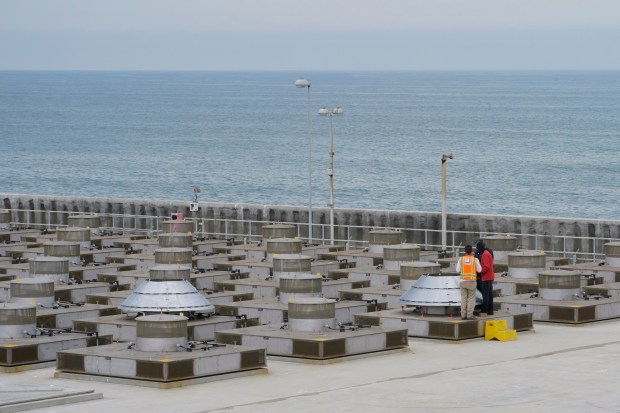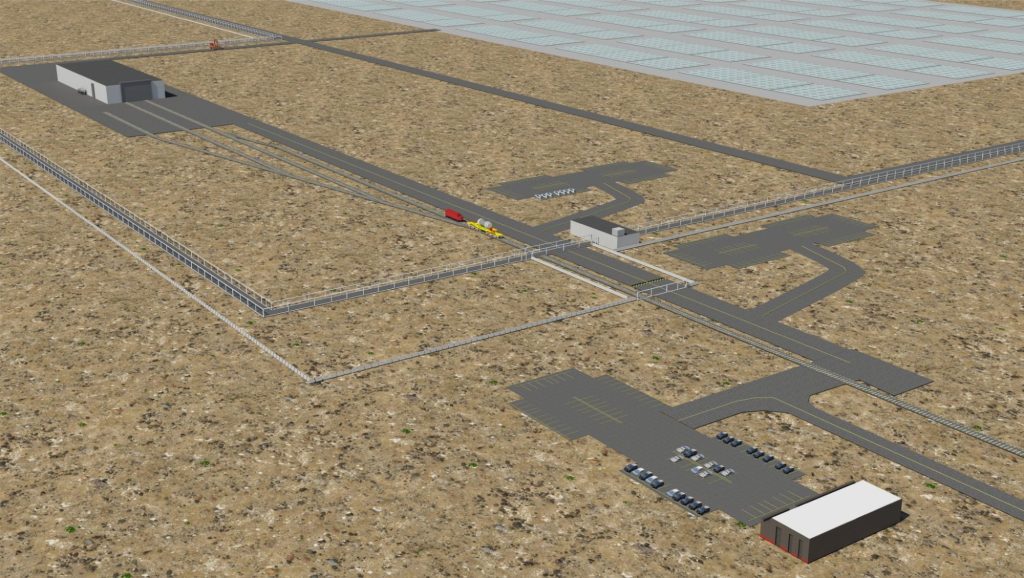A private company that designs and manufactures parts for nuclear reactors has abandoned a project in New Mexico that sought to store nuclear waste from commercial power plants for an unspecified number of years.
Holtec International confirmed the decision last week, following strong opposition from state lawmakers, including New Mexico’s governor.
The New Jersey-based company, in tandem with a group from Eddy and Lea counties in southeast New Mexico, wanted to build a huge facility that could store 500 canisters holding about 8,680 metric tons of commercial nuclear waste. Called Hi-Store, the project had plans to expand to 10,000 canisters holding roughly 120,000 metric tons of spent fuel.
For perspective, that’s more than the roughly 91,000 metric tons of waste that’s been accumulated by all the nuclear power plants in 35 states across the country.
The now-shuttered San Onofre Nuclear Generating Station holds 3.55 million pounds of spent fuel — the equivalent of 1,610 metric tons — in dozens of canisters at the facility, called SONGS for short.
So at least in theory, the Holtec project in New Mexico would certainly have been large enough to take San Onofre’s waste, if it were to receive federal approval to be shipped there.
A board member of the Eddy-Lea Energy Alliance of New Mexico told the Union-Tribune in June that “it makes sense that we could do what we could to help you at San Onofre as one of our primary receiving sites.”
The U.S. Nuclear Regulatory Commission two years ago approved a license for Holtec to build and operate what’s called a “consolidated interim storage facility” at the site.
But Holtec has thrown in the towel, saying in a statement last week that after discussions with the Eddy-Lea Energy Alliance “and due to the untenable path forward for used fuel storage in New Mexico, we mutually agreed upon canceling the agreement.”
Holtec officials said the company will now “work with other states who are amenable” to discuss possibly taking on similar nuclear storage projects.
“I’m glad that Holtec heard our strenuous objections and decided that fighting to put more nuclear waste in New Mexico was a losing proposition,” New Mexico Gov. Michelle Lujan Grisham said in a statement.
New Mexico is already home to the Waste Isolation Pilot Plant, an underground repository for nuclear material generated from weapons production, and the state’s governor and many of its lawmakers feel the Land of Enchantment has done more than its share in dealing with the long-running problem of where to store nuclear waste.
For decades, Yucca Mountain in Nevada had been slated as a permanent site to take spent fuel that has stacked up over the years at the nation’s commercial nuclear power plants.
But the Obama administration cut off funding for Yucca in 2010, after years of protests from lawmakers in the Silver State who had long opposed the project. The project’s costs came to at least $15 billion before getting shelved.
With Yucca off the table, federal officials have gone back to the drawing board, looking at potential sites to accept some or all of the country’s commercial spent fuel, either on an interim (i.e., a still-to-be determined period) or permanent basis.
In 2023, the U.S. Department of Energy put up an initial allocation of $26 million to identify communities that may be interested “in learning more about hosting” a potential interim facility.
But one likely sticking point is that until a permanent site is announced, it may be difficult to find a community willing to accept an interim facility because of the fear that the waste will remain there indefinitely.
“It’s inappropriate to call anything ‘interim’ when you don’t have a permanent repository,” New Mexico state senator Jeff Steinborn told Associated Press last week.
In a similar vein, a proposed commercial waste project in West Texas has hit roadblocks.
A group called Interim Storage Partners proposed storing 40,000 metric tons of waste in canisters in a remote portion of Andrews County, Texas.
Despite a U.S. Supreme Court decision earlier this year that ruled the Nuclear Regulatory Commission was within its rights to grant the company a 40-year lease, Texas Gov. Greg Abbott fought against the project, in part due to fears of an accident disrupting drilling in the state’s oil-and-gas-rich Permian Basin.
In a statement to a Texas television station shortly after the Supreme Court ruling, Interim Storage Partners announced it was putting the project on hold, saying, “we will not proceed with any development … without the consent of the state of Texas.”

(Nelvin C. Cepeda / The San Diego Union-Tribune)
Vertically stored casks of spent fuel remain in the dry storage facility at the decommissioned San Onofre Nuclear Generating Station. (Nelvin C. Cepeda / The San Diego Union-Tribune)
As for the waste at San Onofre, 73 stainless steel canisters sit on a storage site at the north end of SONGS. Loaded with spent fuel assemblies, the canisters have been lowered into vertical cavities behind a seawall a little more than 100 feet from the Pacific.
An additional 62 canisters rest horizontally nearby — 50 of them filled with fuel assemblies from the time the facility generated power and another 12 containing radioactive debris from dismantling the plant.
Southern California Edison officials say more than 80% of the canisters could be taken off-site now if a permanent or interim storage facility existed and 100% of canisters will be ready to be shipped by 2030.
SONGS is in the process of being decommissioned. It has not produced electricity since 2012, after a leak in a steam generator tube led to its closing.
The plant is in the sixth year of dismantling above-ground structures, which is scheduled to wrap up by the end of 2028.
The SONGS Community Engagement Panel will hold one of its quarterly meetings Thursday. The seminar will include a review of inspections done on the canisters at San Onofre’s storage sites.
The seminar begins at 5:30 p.m. at the Casino San Clemente, 140 West Avenida Pico, or online via Microsoft Teams by going to https://www.songscommunity.com/community-engagement/meetings
Originally Published: October 15, 2025 at 11:14 AM PDT

